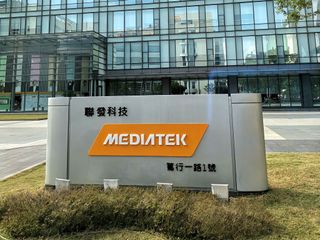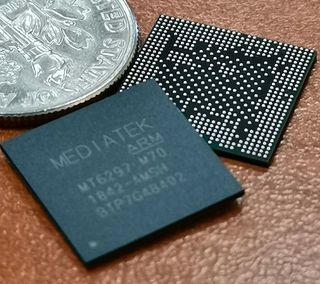MediaTek targets 2019's affordable flagships with AI-equipped P90 chip

The mid-to-high-end space is the most interesting part of the smartphone industry right now. Phones like the OnePlus 6T and Xiaomi Mi 8 Pro are fiercely competitive in a way we rarely see at the very high end. And now Taiwanese chipmaker MediaTek is looking to bring unique new AI capabilities to this level of handset in 2019, with the launch of the Helio P90 chipset.
Unveiled at an event in Beijing, China today, MediaTek's latest processor builds on the features of the Helio P70, with quicker CPU cores and a speedier GPU. But it's the new dual-core APU and AI accelerator -- MediaTek's new AI hardware -- that looks to set it apart from rival chips in this price category. Think something similar to Huawei's dual NPU (Neural Processing Unit) from the Kirin 980, only in a mid-to-high tier handset. Connectivity-wise, you're looking at Cat12/13 LTE for 600Mbps data speeds.
MediaTek has had a less visible presence in the Western smartphone market in recent years. However the company's silicon is increasingly ubiquitous in IoT devices like Amazon's Echo Dot and many Google Assistant-enabled devices. In recent weeks, the company also debuted its first 5G modem, the M70, which will be attached to a future high-end processor. At a meeting with journalists at its headquarters in Hsinchu, Taiwan, the company was keen to convey that it's accelerating its efforts in the smartphone space, and very much intends to be part of the coming wave of 5G hype in the latter part of 2019.
A substantial upgrade from the previous gen, now with extra AI goodness.
But before we get there, we'll see the first devices with the MediaTek Helio P90. The new octa-core processor combines two high-power ARM Cortex-A75 cores at 2.2GHz with six efficient Cortex-A55s at 2.0GHz, using a 12-nanometer process. That's paired with a PowerVR GM 9446 GPU (a more than 50 percent performance improvement from the previous generation), and MediaTek's own CorePilot load-balancing technology, which can help balance load across cores for more efficient power consumption and minimal heat. Both A75 and A55 are proven designs, and although the 12nm process is no longer cutting edge, it's should still be appropriately efficient for a chip on this category.
MediaTek's new multi-core APU is what steps the P90 apart, with a 4X AI performance bump over the previous generation P60 and P70 chips. The Helio P90's AI Fusion architecture can allocate AI tasks to either the chip's APU, AI Accelerator or the triple-IPU (image processing unit) to far outperform rival chips in the mid-tier price category. The company's own AI Benchmark scores place the new chip above Snapdragon 845 phones like the OnePlus 6, and even Huawei's Mate 20 Pro, while falling only slightly short of figures for the upcoming Snapdragon 855. For app developers and device makers, APU is leveraged through MediaTek's NeuroPilot platform, which enables it to run frameworks such as TensorFlow, TensorFlow Lite, Caffe and Caffe2, as well as Android's own neural networking APIs.
In our meeting at MediaTek HQ ahead of launch, the company showed off AI scene detection running on a P90 demo board attached to a display, where the APU was able to identify the type of content on-screen -- for example sports, landscape, action movies -- and tune the display accordingly.
MediaTek claims its chip can rival the Mate 20 Pro's image processing.
Another demo showed realtime AI stabilization in a video call, handled automatically by the device. MediaTek told us that features like this will be available to device makers as part of a turnkey solution.
Be an expert in 5 minutes
Get the latest news from Android Central, your trusted companion in the world of Android
The APU can also be brought to bear in photography, one area where Huawei and Google have excelled using AI features over the past year. MediaTek showed us photos from an early P90 demo device using the same camera hardware as the Huawei Mate 20 Pro, in a dark garage setting. Compared to a side-by-side shot taken with the current Huawei flagship, the P90 produced a comparable-looking photo, with slightly more fine detail. That's a single sample shot, of course, but the fact that a mid-range chip can be coaxed into producing shots in the same ballpark a something like a Mate 20 Pro is impressive.

Bottom line: Premium AI features like this are no longer exclusive to the most expensive smartphones. And the demos MediaTek showed us only scratch the surface. The company also mentioned it's working with a U.S.-based partner on AI translation features, and noted possible uses in gaming and real-time object recognition too. How this plays out in real-world use remains to be seen, but MediaTek is targeting a competitive price point, and seems to have the tech to back up its claims.
What's more, the P90's photo and video credentials are impressive in their own right, with up to 48MP single-sensor capture supported, or 24+16MP dual-sensor capture. Super-slow-motion capture at 480 frames per second is supported at up to 16MP. MediaTek also confirmed that the new chip will support Google Lens's AR features, which will be accelerated by the APU.
The Helio P90 isn't an all-singing, all-dancing, super-expensive flagship chip, nor is it the 5G-toting high-end SoC the company hopes will hopes will allow it to break back into the U.S. market in a meaningful way. But it is a significant development for phones in the most competitive price bracket right now. And it underscores the importance of dedicated AI hardware in the future of smartphones, even outside of the top-tier premium flagships. In that respect, MediaTek is comfortably ahead of the curve. Yet in the U.S. market, it remains to be seen whether the dominant Qualcomm can be dislodged in any market segment.
Devices featuring the MediaTek Helio P90 are due to appear starting in the first half of 2019.

Alex was with Android Central for over a decade, producing written and video content for the site, and served as global Executive Editor from 2016 to 2022.
